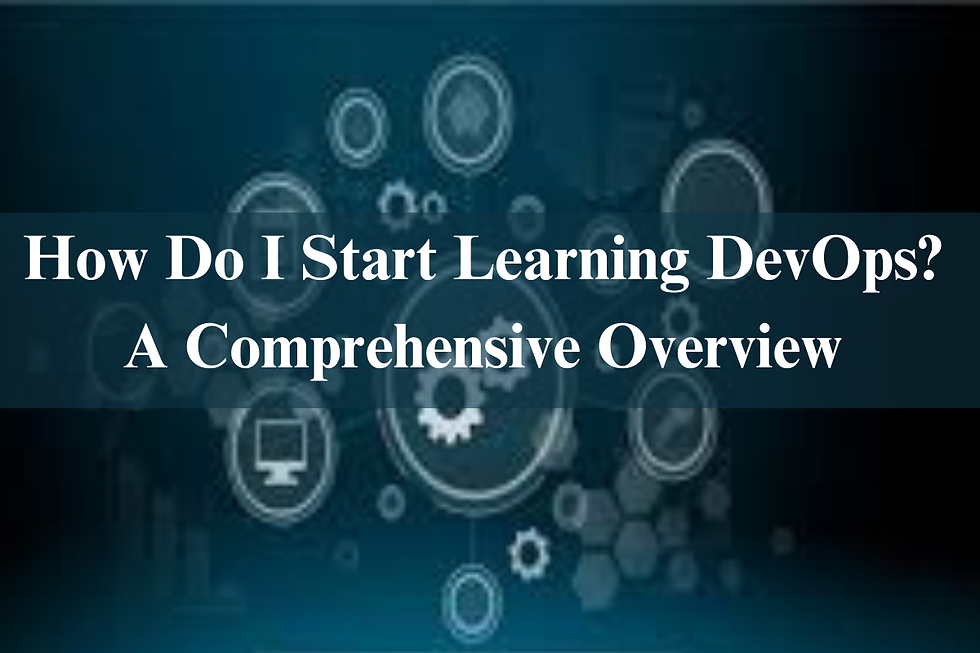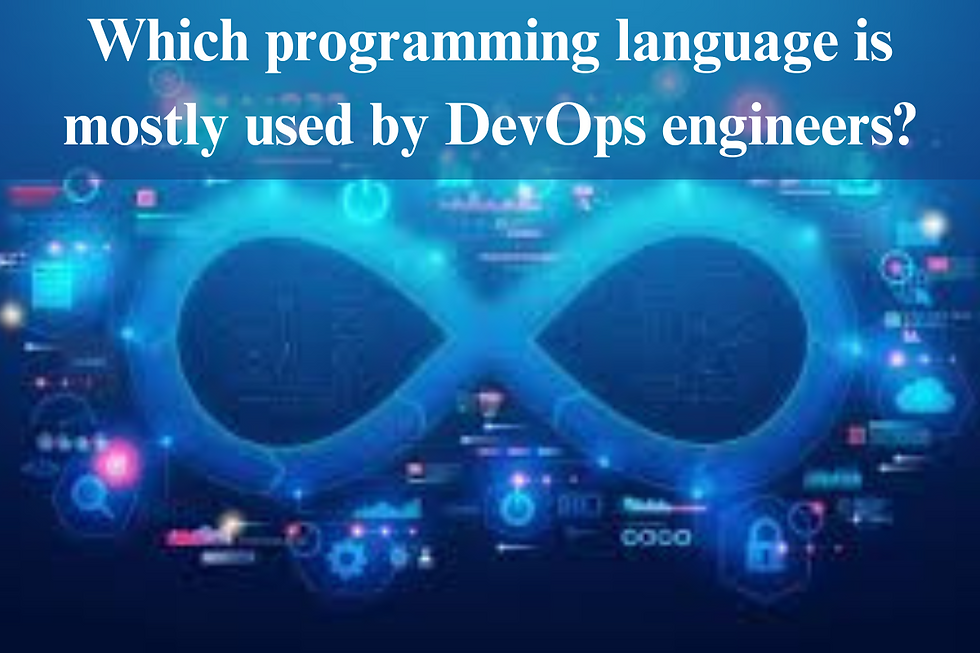How Do I Start Learning DevOps? A Comprehensive Overview
- kanika chauhan

- Aug 22, 2024
- 4 min read

DevOps, a blend of "Development" and "Operations," has emerged as a vital approach in the software development industry. It bridges the gap between software development (Dev) and IT operations (Ops) to ensure faster and more reliable software delivery. If you're looking to start your journey into DevOps, this comprehensive guide will help you understand the key steps to get started, the essential skills you need to acquire, and the best practices for success.
Understanding DevOps: What Is It?
Understanding the "what" is crucial before delving into the "how." DevOps is a cultural and technical movement that focuses on cooperation, automation, and continuous improvement. It focuses on automating and integrating the processes between software development and IT teams, allowing them to build, test, and release software faster and more reliably.
DevOps isn't just a set of tools or a single methodology; it's a mindset that encourages continuous learning, experimentation, and adaptation. DevOps attempts to reduce the software development lifecycle while providing high-quality software by encouraging collaboration among formerly siloed teams.
Why Should You Learn DevOps?
DevOps is in high demand across industries due to its ability to enhance productivity, improve product quality, and accelerate time-to-market. Companies are increasingly adopting DevOps practices to stay competitive, making it a highly sought-after skill set.
Whether you're a developer looking to expand your skill set or an IT professional aiming to stay relevant, learning DevOps can open up numerous career opportunities. Mastering DevOps may help you become an important asset to any firm, promoting efficiency and creativity.
Step 1: Build a Strong Foundation in IT Basics
Before diving into DevOps-specific tools and practices, it's crucial to have a solid understanding of IT fundamentals. This includes knowledge of operating systems, networking, and basic scripting languages. Familiarity with command-line interfaces (CLI) and version control systems like Git is also essential.
Here are some key areas to focus on:
Operating Systems: Gain a strong understanding of Linux, as it's widely used in DevOps environments.
Networking: Learn the basics of networking, including TCP/IP, DNS, and firewalls.
Scripting: Start with simple scripting languages; Bash and Python are popular choices for automation work.
Version Control: Get comfortable with Git, the most widely used version control system in the industry.
Step 2: Learn Key DevOps Tools
DevOps relies heavily on automation tools to streamline processes and improve efficiency. As you proceed in your studies, become familiar with the following major DevOps tools:
Version Control: Git is essential for managing source code and collaborating with other developers.
CI/CD Tools: Jenkins, CircleCI, and Travis CI are popular tools for automating the build, test, and deployment processes.
Configuration Management: Tools like Ansible, Puppet, and Chef help automate the configuration and management of infrastructure.
Containerization: Docker is a must-learn for creating, deploying, and managing containers. Kubernetes is the leading platform for orchestrating containerized applications.
Monitoring and Logging: Prometheus, Grafana, and ELK Stack (Elasticsearch, Logstash, Kibana) are essential for monitoring application performance and troubleshooting issues.
Step 3: Understand Cloud Computing
Cloud computing plays a significant role in DevOps, offering scalable and flexible infrastructure for deploying and managing applications. Understanding cloud services and platforms is crucial for anyone looking to master DevOps.
Here are some key cloud platforms to explore:
Amazon Web Services (AWS): The best supplier of cloud services, providing a vast array of networking, storage, and computer services.
Microsoft Azure: A popular cloud platform used by enterprises for building, deploying, and managing applications.
Google Cloud Platform (GCP): Known for its powerful data analytics and machine learning services, GCP is another key player in the cloud space.
Step 4: Embrace the DevOps Culture
DevOps is as much about culture as it is about tools. To truly excel in DevOps, you need to embrace its core principles:
Collaboration: Break down silos between the development and operational departments. Create an environment of collaboration in which everyone work closely to achieve common goals.
Automation: Automate repetitive tasks to save time and reduce the risk of human error. This includes everything from code testing to infrastructure management.
Continuous Improvement: Always look for ways to improve processes, whether it's by adopting new tools, refining workflows, or learning from failures.
Feedback Loops: Implement continuous feedback loops to ensure that issues are identified and addressed quickly. This helps improve the quality of your software and the efficiency of your processes.
Step 5: Gain Hands-On Experience
Theoretical knowledge is essential, but hands-on experience is where you'll truly learn DevOps. Start by setting up your own projects and experimenting with the tools and practices you've learned. Here are some ideas for gaining practical experience:
Create a CI/CD Pipeline: Build a simple CI/CD pipeline using tools like Jenkins or GitLab CI. Practice automating the build, test, and deployment processes.
Deploy Applications on the Cloud: Use cloud platforms like AWS or Azure to deploy and manage applications. Experiment with containerization and orchestration using Docker and Kubernetes.
Contribute to Open Source Projects: Get involved in open-source projects that use DevOps practices. This will give you real-world experience and help you build a portfolio.
Step 6: Join the DevOps Community
Finally, connect with the DevOps community to stay up-to-date with the latest trends and best practices. Join online forums, attend meetups, and follow DevOps thought leaders on social media. Engaging in the community will give you inspiration, networking chances, and insightful knowledge.
Conclusion
Starting your journey in DevOps can seem daunting, but by building a strong foundation in IT basics, mastering key tools, and embracing the DevOps culture, you'll be well on your way to success. Remember, DevOps is a continuous learning process, so stay curious, experiment with new technologies, and always seek ways to improve. As you gain experience and knowledge, you'll find yourself becoming a vital contributor to any DevOps team. For those in the region, enrolling in a DevOps Training Institute in Faridabad, Greater Noida, Delhi, Noida, Gurgaon and other cities in India can provide the structured guidance and hands-on experience needed to accelerate your learning. Happy learning!



Comments